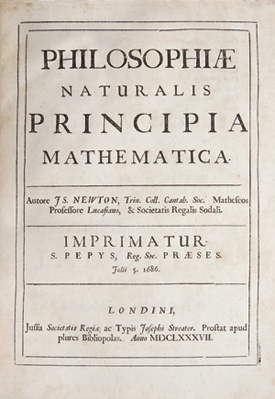Exhibit Highlights
burns library
Scientific Revolutions:
An Exhibition of Early Scientific Works from the John J. Burns Library
October 7, 2010 – January 31, 2011
Francis Thompson Room
To view this exhibit please see the Burns Library hours.
This exhibit features a first edition of Sir Isaac Newton’s Principia (1687) and includes works by Copernicus, Galileo, Clavius, Kircher, Schott, Scheiner and Grassi. Each of these books demonstrates the unique contributions of the individual authors to the wider sphere of scientific thought. From Copernicus’s heliocentric model of the universe to Kircher’s fantastic voyage through the heavens, all of these books have something to tell us about scientific thought and life from late sixteenth to the early eighteenth century. These core works in the history of science provide students at Boston College with a study and research opportunity few other institutions are able to offer.
 Sir Isaac Newton, Philosophiae Naturalis Principia Mathematica (London: Joseph Streeter, 1687)
Sir Isaac Newton, Philosophiae Naturalis Principia Mathematica (London: Joseph Streeter, 1687)
In January 2010, the Burns Library and Boston College Libraries, in collaboration with the Boston College Department of Physics, became one among select institutions to acquire the first edition of Isaac Newton’s ground-breaking work, Philosophiae Naturalis Principia Mathematica ("Mathematical Principles of Natural Philosophy"), popularly known as the Principia. About 250 copies of this edition were printed in 1687, of which fewer survived to our times. Now housed in the Burns Library, this volume joins a growing body of major early science books in Boston College’s collection.
Sir Isaac Newton, 1643 – 1727, arguably the most influential scientist in human history, was appointed Lucassian Professor of Mathematics at Trinity College, Cambridge University in 1669. From 1703 till the end of his life, he served as the President of the Royal Society. Apart from his academic positions, Newton also served as the Master of the Mint in London, from 1699. He was knighted by Queen Anne in 1705, the first scientist to be so honored.
Newton is recognized, most notably, for advancing the modern "scientific method", seeking to explain empirical data starting from universal laws, as few in number and as general as possible. In addition to laying the foundations of classical mechanics, he conducted pioneering studies of light and the solar spectrum (published as Opticks in 1704), and invented a refracting telescope, which uses a converging mirror rather than a combination of lenses. He is also credited with the development, independently from Leibnitz, of infinitesimal calculus, the precursor of modern differential and integral calculus.
The Principia, wherein Newton formulated the three laws of motion and the law of universal gravitation, marks the transition from what used to be called the Natural Philosophy to physics. Albert Einstein declared Principia to be "perhaps the greatest intellectual stride that it has ever been granted to any man to make."
Photograph by Lee Pellegrini, Senior Photographer, Office of Marketing and Communications, Boston College